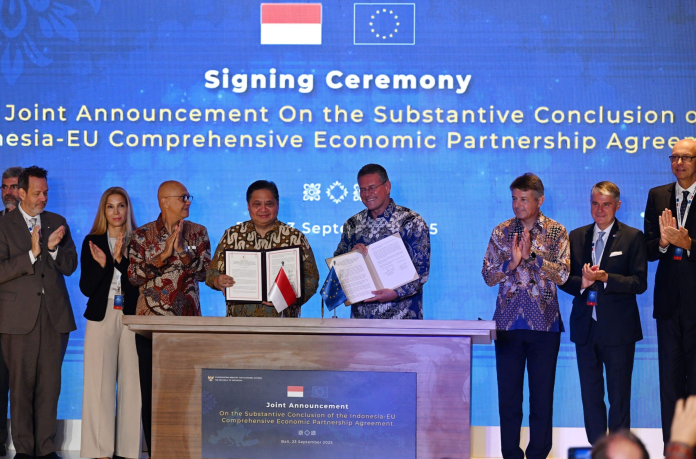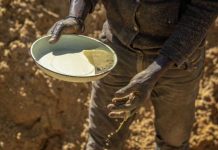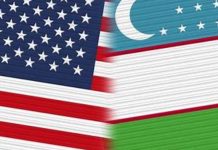DENPASAR, INDONESIA, SEPT 23 (AFP/APP/DNA):Indonesia and the European Union finalised negotiations on a trade agreement Tuesday after nearly a decade of talks, a senior minister said.
The Indonesia-European Union Comprehensive Economic Partnership Agreement (CEPA) is the third deal Brussels has signed with Southeast Asian countries, after Singapore and Vietnam.
The pact was signed by EU Trade Commissioner Maros Sefcovic and Indonesian Minister of Economic Affairs Airlangga Hartarto in Bali and will open investment in strategic sectors such as electric vehicles, electronics, and pharmaceuticals.
“By finalising this agreement, the EU and Indonesia are sending a powerful message to the world that we stand united in our commitment to open rules-based and mutually beneficial international trade,” Sefcovic said after the signing.
“In all, EU exporters will save some 600 million euros ($708 million) a year in duties paid on their goods entering the Indonesian market, and European products will be more affordable and available to Indonesian consumers.” EU President Ursula von der Leyen said in a statement.
– The right moment –
Indonesia has been in talks with the EU since 2016, but negotiations for a trade deal initially saw little progress.
Issues such as palm oil and deforestation posed stumbling blocks, but US President Donald Trump’s sweeping tariff policy “created the urgency” to expedite an agreement, said Deni Friawan, researcher at the Centre for Strategic and International Studies.
The trade deal also included a protocol on palm oil, the EU said in a statement, without providing details.
President Prabowo Subianto travelled to Brussels in July and announced with EU chief Ursula von der Leyen that the two sides had reached a “political agreement” to conclude the deal after 19 rounds of negotiations.
Indonesian chief economic minister Airlangga Hartarto said uncertainties caused by the “tariff war and protectionism” between major countries pushed the two sides “to seek certainty through a stable bilateral agreement”.
“This is a ten-year journey that has resulted in a milestone that reflects our commitment and the commitment of stakeholders to an open, fair, and sustainable economic assistance,” he told a news conference.
The agreement was expected to “mitigate risks from the impact of the global tariff war”, Airlangga told AFP in a statement.
“This signing came at the right moment. It was finalised because of Donald Trump’s tariff war, and we need to seek an alternative market in Europe, and Europe has the same interest, they need a market to penetrate,” Bhima Yudhistira Adhinegara, executive director of the Center of Economic and Law Studies, told AFP.
Around 80 percent of Indonesian exports to the EU will be tariff-free after the deal comes into force, Airlangga said in June.
It is expected to benefit the country’s top shipments to the bloc including palm oil, footwear, textiles and fisheries, he added.
The EU is Indonesia’s fifth-largest trading partner with bilateral trade reaching $30.1 billion last year.
The agreement would further open up EU access to the Indonesian market of around 280 million people, Deni said.

















